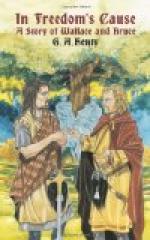“The king is taken!” Archie Forbes shouted; “ride in, my lords, and rescue him.”
Most of the Scotch knights were so hardly pressed that they could do nothing to aid the king; but Christopher Seaton joined Archie, and the two knights charged into the midst of the throng of English and cut their way to Bruce. Sir Philip Mowbray, who was beside the captured monarch, was overthrown, and several others cut down. Bruce leapt into his saddle again and the three for a time kept at bay the circle of foemen; but such a conflict could have but one end. Archie Forbes vied with the king in the strength and power of his blows, and many of his opponents went down before him. There was, however, no possibility of extricating themselves from the mass of their foes, and Bruce, finding the conflict hopeless, was again about to surrender when a great shout was heard, and a close body of Scottish spearmen threw themselves into the ranks of the English horse. Nothing could withstand the impetuosity of the assault. The horsemen recoiled before the levelled spears, and the pikemen, sweeping onward, surrounded the king and his companions.
“Well done, my brave fellows!” Archie cried; “now keep together in a close body and draw off the field.”
The darkness which had at first proved so disastrous to the Scots was now favourable to them. The English infantry knew not what was going on. The cavalry tried in vain to break through the ranks of the spearmen, and these, keeping closely together, regained the shelter of the wood, and drew off by way of Dunkeld and Killiecrankie to the mountains of Athole. On their way they were joined by Edward Bruce, the Earl of Athole, Sir Neil Campbell, Gilbert de la Haye, and Douglas, and by many scattered footmen.
To his grief Bruce learned that Randolph, Inchmartin, Somerville, Alexander Fraser, Hugh de la Haye, and others had been captured, but the number killed had been small. When once safe from pursuit a council was held. It was agreed at once that it was impossible that so large a body could find subsistence in the mountains of Athole, cooped up as they were by their foes. The lowlands swarmed with the English; to the north was Badenoch, the district of their bitter enemies the Comyns; while westward lay the territory of the MacDougalls of Lorne, whose chieftain, Alexander, was a nephew by marriage of the Comyn killed by Bruce, and an adherent of the English.
Beyond an occasional deer, and the fish in the lochs and streams, the country afforded no means of subsistence, it was therefore decided to disband the greater portion of the force, the knights and nobles, with a few of their immediate retainers, alone remaining with the king, while the main body dispersed and regained their homes. This was done; but a few days later a messenger came saying that the queen, with the wives of many of the gentlemen, had arrived at Aberdeen and sought to join the king. Although an accession of numbers was by no means desirable, and the hardships of such a life immense for ladies to support, there was no other resource but for them to join the party, as they would otherwise have speedily fallen into the hands of the English. Therefore Bruce, accompanied by some of his followers, rode to Aberdeen and escorted the queen and ladies to his mountain retreat.




